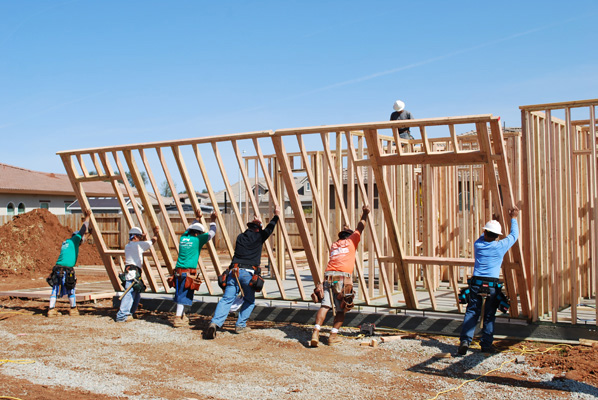As you begin to assess the damage to your home and property, we would like to help you make an informed decision regarding your contractor choice. Before you hire a contractor, we strongly encourage you to do your homework to ensure that you are hiring a reputable, qualified individual or company to help you rebuild your home or business.
Here are a few important guidelines to help you select a competent builder or remodeler:
- Make sure the contractor has a permanent business location and a good reputation with a local bank and suppliers.
- Find out how long they have been in the building business. You want to know that your contractor will be around after construction is complete to fulfill any warranty obligations.
- Check with your local Better Business Bureau to learn if any complaints have been filed against your contractor.
- Some Texas cities require that builders are registered and bonded. Check with your city’s building permits department in this regard.
- Ask for and verify references.
- Enter into a complete and clearly written contract with your builder or remodeler.
- Do not pay for the entire job up front or pay in cash. In fact, state law prohibits contractors in disaster areas from taking up front money unless they have held a physical business address in the county or adjacent county for at least one year. This law, found in Chapter 58 of the Texas Business and Commerce Code, provides other valuable protections for those rebuilding in disaster areas.
- Be cautious of unusually low-priced bids or a hard-sell to “sign today” for a low price.
- Visit the online resources available to you at www.texasbuilders.org.
Some expenses are tax-exempt
We also want to remind you that some recovery-related expenses are exempt from state and local taxes. Please keep these in mind as you review any bills or invoices that you receive from your contractor:
- Texas never imposes sales tax on labor for residential repairs.
- In a declared disaster area, purchasers may claim an exemption from sales tax on separately stated charges for labor to repair or restore nonresidential real property damaged by the disaster. The materials that are used to perform the repairs are taxable.
- Taxpayers may claim an exemption from sales tax on charges for labor to repair or restore items damaged by a disaster. The exemption may be claimed on labor to repair furniture, appliances, or other items of tangible personal property. The exemption includes labor costs to launder or dry clean damaged clothes or other property.
- Arborists’ services, such as cutting down or cutting up a damaged or dead tree in a declared disaster area, are not taxable.
- Hauling away branches, limbs, or trees are waste removal services and are taxable.
- Goods and taxable services may be purchased tax free with FEMA, Salvation Army or Red Cross debit cards or vouchers.
As you begin to repair your home, make sure your contractor is an experienced professional.
Advertisement
Article courtesy of the Texas Association of Builders (TAB).

